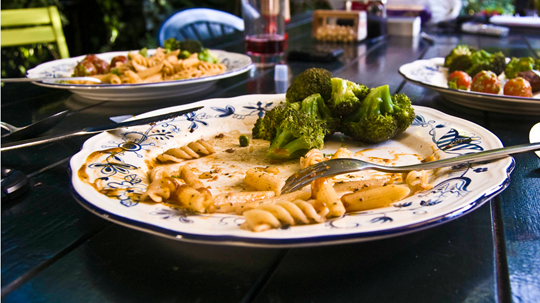
Feed Your Enemies
There’s a curious sentence in Psalm 23 that unsettles me. David writes, “You prepare a feast for me in the presence of my enemies.” In the same passage where the king presents God as the Good Shepherd and celebrates his provision, he throws in this radical thought about eating with enemies as if that’s totally normal.
The idea of actually sitting down with those who might be on the opposite side of the ideological fence is appealing. But how do we move beyond our default behaviors of avoiding and marginalizing our enemies to breaking bread with them?
Surrounding ourselves with people who look and think like us is a difficult habit to overcome. Sameness brings us comfort (we don’t need to explain ourselves), acceptance (we tend not to judge those who are like us), and at least a semblance of peace (we are less likely to fear those who resemble us).
One could argue that this tendency is simply human nature, done reflexively and without malice. It’s also human nature to steal, lie, and cheat. So why do most of us try to resist stealing, lying, and cheating but give ourselves permission to remain in largely insular subgroups?
While some would attribute this tendency to genetics and/oreducation, the spiritual components should not be overlooked. Unforgiveness, envy, pride, anger, and perhaps—most deeply—fear, all serve as barriers to those who are unlike us.
Fear combines the physiological/biological component that causes our hearts to race and our palms to sweat with the deeper psychological/spiritual component of which we are largely unaware but often beholden. Our fear of those who are different has two roots: scarcity and compromise.
Even when we are not in danger, we may fear engaging with those who are opposed to or different from us because we believe that there is only a limited amount of goods (power, food, jobs, etc.) to go around. If I lower the barricades and cozy up with my ideological opponents, won’t my share diminish? This belief runs on the assumption that the world’s resources are finite and we’re essentially on our own to provide for ourselves.
The authors of Slow Church, C. Christopher Smith and John Pattison offer a contrasting perspective: “We live in a culture that is driven by an economy rooted in the myth that there is not enough, but we also live within the biblical narrative that repeatedly emphasizes that God created the world and loves it immensely and will sustain it.” In order to actually believe the more compelling biblical narrative, we must feed our faith and starve our fear—a feat we can accomplish when we give generously and thank God continually.